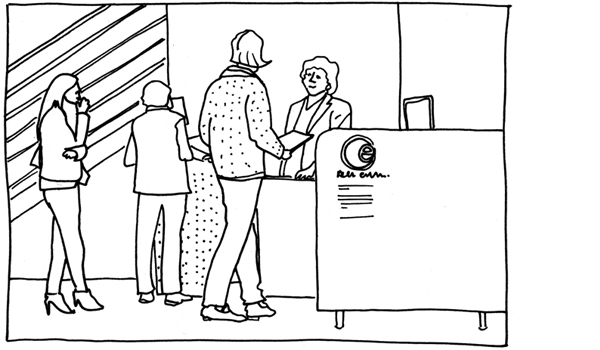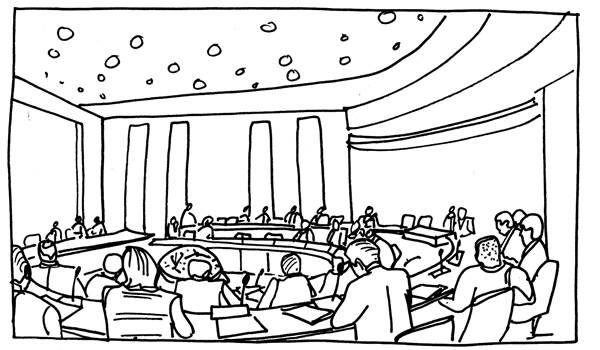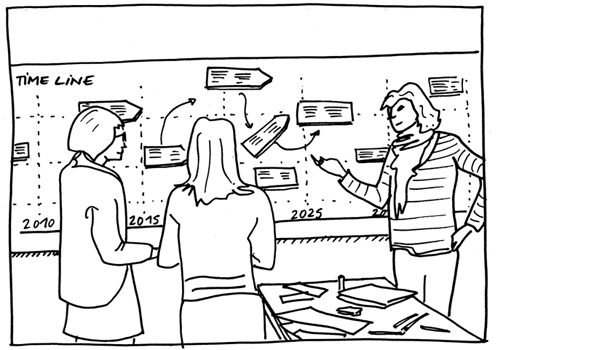Scenario > Multi-level Governance Enables Participation and Detailed Consultation
This is a future scenario* to show how the charter can create a shift in how Multi-level governance (MLG) is applied in Europe. It has been developed during the “Emulation Workshop” organized at the CoR (Brussels – 3/02/2012).
* The following story is a fiction imagined during the co-creation process and does not engage the public authorities or stakeholders eventually mentioned.
–
SCENARIO
Antigoni Papakonstantinou, 35 years old, expert in the Cabinet of the Greek ministry Public Administration (Greece)
The ministry is contemplating reforming the public administration structure and function. A white book is being drafted. The overall aim is to come up with leaner, more efficient and participative administrative culture and procedures. I heard of the Charter through one of the Greek CoR members who was present at the launch event in Brussels. At first I was not convinced, but after speaking to my colleagues from the BE and IT ministries I started thinking that the CoR MLG charter could be useful for our work. I thus proposed to the minister that the CoR MLG charter could be an initial source of inspiration for a full implication of all stakeholders vertical/ horizontal in the initial consultation process and finally in the outcome of the reform (final product), i.e. it would guide consultation processes, it would help identify tools and options, it would provide stimuli for experimentation and brainstorming and it would form the basis of the participatory process leading to the adoption of the final blue-print.
–
Scenario > Multi-level Governance Charter in the context of job searching
This is a future scenario* to show how the charter can create a shift in how Multi-level governance (MLG) is applied in Europe. It has been developed during the “Emulation Workshop” organized at the CoR (Brussels – 3/02/2012).
–
SCENARIO
Manon Dupont, unemployed, 19 (France)
” I’m a young unemployed. My needs? Access to a training, getting practical experience and receiving indemnities. I went to the local employment service, but they couldn’t help me with any indemnities. They gave the advice to meet the regional office and to also contact the regional Chamber of Commerce for a potential internship. In addition to that, nobody could even help me on opportunities abroad. For the training, I have to visit the provincial administration. They are all asking for different papers. I’m reclaiming a “one-stop-shop” and I lodged a complaint to the mediator on the basis of the Multi-level governance charter. Those bodies of services should organize themselves to provide a more efficient service. ”
–
Scenario > Multi-level Governance triggers the opportunity to negotiate for funds
This is a future scenario* to show how the charter can create a shift in how Multi-level governance (MLG) is applied in Europe. It has been developed during the “Emulation Workshop” organized at the CoR (Brussels – 3/02/2012).
* The following story is a fiction imagined during the co-creation process and does not engage the public authorities or stakeholders eventually mentioned.
–
SCENARIO
Aleksey Driovic, Senor Policy Advisor (Ukraine)
” Along with my Ukrainian colleague, we have launched an appeal to the EU institutions based on the MLG Charter which guarantees all level of governments to act and use with autonomy financial means. Both the Committee of the regions and the European parliament and the Council of Europe supported our complaint, based on MLG charter commitment, and have made political pressure over our governments. I invite you to the opening of the hospital in the cross-border area, which has been created thanks to the ENP funds and of course the MLG charter. ”
–
Scenario > Baltic Sea Scenario
This is a future scenario* to show how the charter can create a shift in how Multi-level governance (MLG) is applied in Europe. It has been developed during the “Engagement Interviews”, (Brussels – 03-04/2012).
* The following story is a fiction imagined during the co-creation process and does not engage the public authorities or stakeholders eventually mentioned.
–
SCENARIO
Maija Hämäläinen, Mayor of Turku (Finland)
Building on the experience of how cities and regions around the Baltic sea took action to build the EU Baltic Sea Strategy, some cities around the Mediterranean Sea sharing the same issues and problems launched the idea of building a Mediterranean Sea Strategy, especially to share and coordinate on ecological issues threatening the Mediterranean sea. This idea raised interest among other Mediterranean cities recognizing the necessity to collaborate more intensively on common concerns. But when this initial group of cities brought up the idea of building a Mediterranean Sea Strategy to their member states those did not took it very seriously and nothing happens. Then although it is not their role, the group of cities decides to take action anyway and leveraging on the recently issued Charter on Multi-level Governance, they brought their request to of Mediterranean Sea Strategy directly at EU level engaging the respective state ministries to collaborate and finally build the strategy. Lessons learnt that constitute an interesting precedent in terms of Multi-level Governance are: whatever the level stakeholders belong to and whatever role this level they are supposed to have, they should take action and not wait for the proper level do it.
Scenario > Strategy of development of Region
This is a future scenario* to show how the charter can create a shift in how Multi-level governance (MLG) is applied in Europe. It has been developed during the “Engagement Interviews”, (Brussels – 03-04/2012).
* The following story is a fiction imagined during the co-creation process and does not engage the public authorities or stakeholders eventually mentioned.
–
SCENARIO
Piotr Dąbrowski, Regional Director for Poland
All strategies made in Poland involve a detailed consultation process. This has occurred in the Strategy of Development of Region. Polish regions are playing an increasing role in designing regional development strategy. Regions are in charge of managing 24.6% of the cohesion funds, for 2007-2013, more than EUR 16 billion. This contrasts with 2004-06 when all EU funds were allocated at central level. Multi-level Governance (MLG) is being used as a charter to trigger engagement. For the next five year program for Strategy on Regional Development MLG negotiations based on the charter principles are the core elements. Furthermore, 42% of the allocated EU funds are going to be innovatively and ethically invested at a regional level.
–
Scenario > From the Multi-level Governance Charter to a 3D simulator of MLG
This is a future scenario* to show how the charter can create a shift in how Multi-level governance (MLG) is applied in Europe. It has been developed during the “Emulation Workshop” organized at the CoR (Brussels – 3/02/2012).
–
SCENARIO
Dominique Martin, President of the Region Champagne-Ardenne
–
* The following story is a fiction imagined during the co-creation process and does not engage the public authorities or stakeholders eventually mentioned.
Scenario > a forecast exercise to prepare the implementation of the MLG Charter
This is a future scenario* to show how the charter can create a shift in how Multi-level governance (MLG) is applied in Europe. It has been developed during the “Emulation Workshop” organized at the CoR (Brussels – 3/02/2012).
–
SCENARIO
Laure Lartigues, managing director of a society specialized in foresight (Grenoble, France)
Mrs Lartigues, managing director of a society specialized in foresight, has been invited by the City of Lyon to start a new local forecast study aiming to mobilize the actors of the Grand Lyon Metropole around a project of development for the 30 years coming. Aware of the fact that the actors need to mobilize around such an ambitious project far beyond only administration of the City of Lyon. There is an opportunity to involve a number of local administrations related to the city (neighbouring cities, department district, universities, state representation in the region, etc.), Mrs Lartigues decided to centre her project on the idea of a vertical and horizontal collaboration between all the actors concerned, through the proposition of a final collaboration pact around the identified objectives.In order to stimulate the interest of the actors to involved, she decided to propose to the City a foresight exercise which will enable the implementation and actualization of the multi-level governance charter principles in a 30 years perspective.
Scenario > MLG Charter as a basis to set up territorial cooperation
This is a future scenario* to show how the charter can create a shift in how Multi-level governance (MLG) is applied in Europe. It has been developed during the “Emulation Workshop” organized at the CoR (Brussels – 3/02/2012).
* The following story is a fiction imagined during the co-creation process and does not engage the public authorities or stakeholders eventually mentioned.
–
SCENARIO
Branislav Dovocicz, 42 Marshall of W. Region, border Poland-Ukraine.
“My region, represented in the EU CoR, has signed the MLG Charter and obtained a label for good governance in 2013. This helped me in convincing my national government to get some autonomy in launching a territorial cooperation agreement with my neighbourhood region from Ukraine. Indeed, the two national governments have some open issues (immigration, energy access, fighting corruption, accession to the EU) which were not helping in facilitating bilateral cooperation at the national level. Having my region received funds from the ENP and Cohesion fund, we thought to use it to start up a trans-border cooperation: with our surprise the national government refused to allocate resources for our project due to sensitive dossiers still open between the two governments.”.
–


